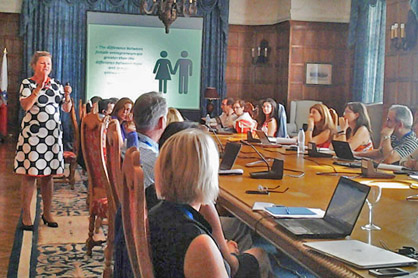5 reasons to enhance gender equality in business
 Renowned CEOs, experts and politicians discussed the benefits of the increasing incorporation of women to decision-making positions and some steps to achieve this goal, in the Encounter “Women, Economy and Business” in UIMP in Santander, financed by the EEA Grants.
Renowned CEOs, experts and politicians discussed the benefits of the increasing incorporation of women to decision-making positions and some steps to achieve this goal, in the Encounter “Women, Economy and Business” in UIMP in Santander, financed by the EEA Grants.
07.08.2014
5 reasons to enhance gender equality in business:
1.European GDP will increase around 14% if there was an effective gender equality, according to the International Monetary Fund (IMF).
2. Companies with greater participation of women on Boards achieved best results in terms of economic performance. Therefore, gender equality is not an ethical or aesthetical issue, is just wealth creation.
3.The value of female work in Norway is much more important for their economy than oil and gas.
4. A change in management is required due to the financial crisis and the new model may be aligned with female leadership skills.
5.To sustain the financing of the welfare state in the long term requires high labour participation and the use of the 100% of talent in our societies, not only 50%.
All these reasons were discussed in the Encounter Women, Economy and Business in UIMP in Santander, within the EEA Grants Gender Equality Programme.
The figures are already well known. 60% of graduates are women, but the percentage of women on Boards is only 17%, the pay gender gap is 22% and there is a majority of businessmen. What are the reasons? Cultural factors, the difficulty of reconciling family and working life and biased promotion systems. For that reason, the participants shared some best practices to enhance gender equality in companies.
In Norway, there is a Quotas Law since 2004 which stipulates that “40% of members on boards must be women”. But the Minister-Counsellor of the Embassy of Norway, Lars Andersen, highlighted as a crucial step the launching of a flexibility policy -to improve work-life balance- agreed between Government, companies and unions.
Gunn Ovensen, Innovation Norway CEO, explained also other measures adopted, like entrepreneurship grants, “the Female Management Scheme or Female Mentor in order to increase women’ management skills, or a successful programme to improve gender equality in R&D”.
In Spain, the Executive Director of Women’s Institute, Carmen Plaza, pointed out the Equality Plan launched by the Spanish Government last March, but also the Equality Network in Companies and the support to SMEs and female entrepreneurs.
Moreover, companies are also realizing that more women on decision-making positions (Steering Committees and Boards of Directors) is profitable. CLH, Banco Sabadell, Bankinter or GDF Suez are increasing their effort on female training with great results, according to Sara Bieger, Partner and Head of Leaders Trust.
The Quotas policy remains controversial, but all the attendants asked for a greater support for work-life balance and flexibility policies as crucial to enhance diversity on Boards.